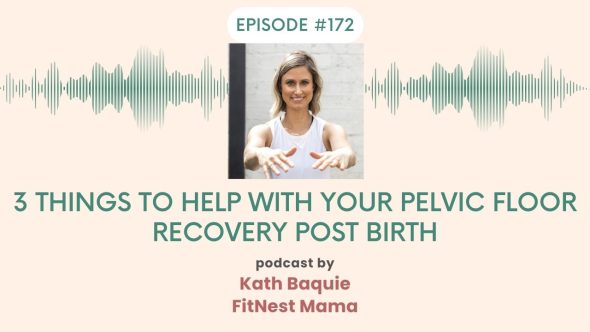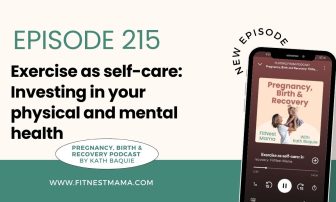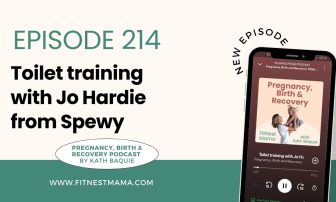The path through pregnancy, labour, and postnatal recovery is a remarkable journey, but it can exert significant strain on a woman’s body, particularly the pelvic floor. To ensure a smoother transition into motherhood and reduce the risk of pelvic floor issues, there are a few ways to help. In this podcast episode, we’ll explore three steps for preparing your pelvic floor for childbirth and supporting your after birth recovery.
1. Pregnancy Fitness: Building a Solid Foundation
The Significance of Pregnancy Fitness
Maintaining an active lifestyle during pregnancy lays the groundwork for a successful postnatal recovery. Engaging in physical activity during pregnancy not only assists in managing a healthy weight but also plays a pivotal role in pelvic floor health. Here’s why it is important:
- Postnatal Pelvic Floor Recovery: Research indicates that pregnancy fitness contributes to a more robust post-birth pelvic floor recovery.
- Weight Maintenance: Keeping your weight in check during pregnancy can positively influence pelvic floor outcomes.
- Overall Well-being: Regular physical activity enhances overall health, making it easier to adapt to the physical demands of childbirth and motherhood.
Overcoming Common Hurdles
Many expectant mothers encounter obstacles to exercising during pregnancy, such as fatigue, time constraints, and discomfort. Recognising these challenges is the first step. Home-based workouts, like those offered by FitNest Mama, can provide a convenient solution to help overcome these barriers.
2. Perineal Massage and Awareness
Harnessing the Benefits of Perineal Massage
Perineal massage is a valuable practice that can reduce the risk of 3rd and 4th degree tears, episiotomy and potentially instrumental delivery during childbirth. However, it encompasses more than just the massage; it involves cultivating awareness of your pelvic floor. Here’s why it can help:
- Reduced Tears and Instrumental Delivery: Studies have demonstrated that perineal massage lowers the likelihood of larger tears and the need for instrumental assistance during delivery.
- Pelvic Floor Relaxation: Perineal awareness helps you comprehend and relax your pelvic floor muscles, a crucial aspect of labour and childbirth, to help open the birth canal and make way for your baby.
Accessing Perineal Massage
Although perineal massage may be uncomfortable, and difficulty to access/reach when 36 weeks pregnant, it may be helpful. Seek guidance and resources, such as those offered by FitNest Mama, to learn how to execute perineal massage effectively and comfortably.
3. Safeguarding Your Pelvic Floor in the Initial Six Weeks Postpartum
The Significance of Postpartum Protection
The initial six weeks following childbirth constitute a critical phase for pelvic floor health. During this period, it is vital to focus on safeguarding and recuperating rather than engaging in intensive strengthening exercises. Here’s what you should do:
- Horizontal Rest: Take brief intervals of rest during the day to relieve the pressure on your pelvic floor.
- Avoid Constipation: Straining during bowel movements can place stress on the pelvic floor. Maintain a diet that promotes regular and painless bowel movements.
- The “Knack”: Practise the “knack” – a gentle pelvic floor lift before sneezing, coughing, or lifting heavy objects.
Gradual Progression
Consider this phase as a time of gradual progression. Instead of rushing into strenuous workouts, prioritise rest, light activities like short walks, and a gradual approach to strengthening.
Preparing your pelvic floor for childbirth is a pivotal aspect of ensuring a smoother transition into motherhood and optimising after birth recovery. By focusing on pregnancy fitness, perineal massage and awareness, and safeguarding your pelvic floor during the initial six weeks postpartum, you can lay the foundation for a healthier and more comfortable postnatal journey. Remember, seeking assistance for any pelvic floor concerns during pregnancy is a proactive step towards prevention, detection and early management. Take charge of your pelvic floor health and embark on the extraordinary journey of motherhood with confidence.
** This podcast has general information only. Always seek the guidance of your doctor or other qualified health professional with any questions or concerns you may have regarding your health or medical condition.
Episode Links
Preparing for birth Pelvic health checklist
Free 7 Day Trial Pregnancy Workouts
Free 7 Day Trial Postnatal Workouts
Instagram @fitnestmama





